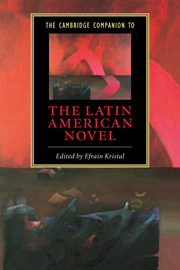Book contents
- Frontmatter
- Introduction
- Part I History
- Part II Heterogeneity
- Part III Gender and sexuality
- Part IV Six novels
- 11 Dom Casmurro by Machado de Assis
- 12 Pedro Páramo by Juan Rulfo
- 13 The Passion According to G.H. by Clarice Lispector
- 14 One Hundred Years of Solitude by Gabriel García Márquez
- 15 The House of the Spirits by Isabel Allende
- 16 The War of the End of the World by Mario Vargas Llosa
- Epilogue
- Bibliography
- Index
- Series List
16 - The War of the End of the World by Mario Vargas Llosa
from Part IV - Six novels
Published online by Cambridge University Press: 28 May 2006
- Frontmatter
- Introduction
- Part I History
- Part II Heterogeneity
- Part III Gender and sexuality
- Part IV Six novels
- 11 Dom Casmurro by Machado de Assis
- 12 Pedro Páramo by Juan Rulfo
- 13 The Passion According to G.H. by Clarice Lispector
- 14 One Hundred Years of Solitude by Gabriel García Márquez
- 15 The House of the Spirits by Isabel Allende
- 16 The War of the End of the World by Mario Vargas Llosa
- Epilogue
- Bibliography
- Index
- Series List
Summary
Focused on a cataclysm at the end of an era, Mario Vargas Llosa’s monumental 1981 novel, La guerra del fin del mundo (The War of the End of the World) also appears to want to signal the end of history - or at least the collapse of ideologies that drive it. Furthermore, in its running commentary on the uses of fiction, on the intellectual’s place in the interpretation of history, this enormous novel seems to herald an end to storytelling. Vargas Llosa has elsewhere referred to the writer’s vocation as “a daily and furious immolation,” and it is notable that he should have chosen a novel about a conflagration to set forth one of his clearest - and most polemical - statements on the force of literature.
The novel has as much to do with storytelling as it is does with history, foregrounding the responsibility of the Latin American writer towards pivotal events. In the wake of his own political realignment - an initial euphoria after the Cuban Revolution followed by a proclaimed loss of faith in political utopias - Vargas Llosa has delineated his position on fiction in stark terms: “I have nothing against fictions […] But there are benign and malign fictions, those that enrich human experience and those that impoverish it and are a source of violence” (MW, 300). This very notion has, ironically, polarized criticism of the novel. Where more formally minded readers have placed La guerra del fin del mundo in the former camp, politically oriented critics have been made uneasy by a series of assumptions and assertions which structure the novel: among them, the notion that the writer can step outside ideology to comment on history from a vantage point of “common sense.”
- Type
- Chapter
- Information
- The Cambridge Companion to the Latin American Novel , pp. 283 - 294Publisher: Cambridge University PressPrint publication year: 2005
- 1
- Cited by



